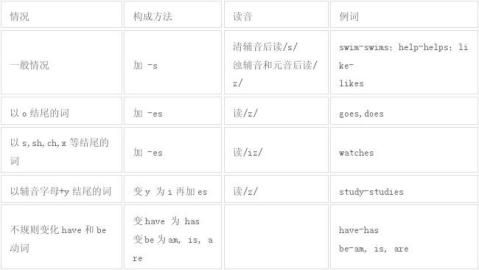一般现在时
定义:一般现在时:表示通常性、规律性、习惯性的状态或者动作(有时间规律发生的事件)的一种时间状态。
句子结构
当主语是第三人称单数时:
肯定句:主语+动词的第三人称单数+其他
否定句:主语+doesn't+动词原形+其他
一般疑问句:Does+主语+动词原形+其他
肯定回答:Yes,主语+does
否定回答:No,主语+doesn't
特殊疑问句:特殊疑问词+一般疑问句
当主语不是第三人称单数时:
肯定句:主语+动词原形+其他
否定句:主语+don't+动词原形+其他
一般疑问句:Do+主语+动词原形+其他
肯定回答:Yes,主语+do
否定回答:No,主语+don't
要注意,句式结构错则全局都错。
变化规律

1
具体运用
1.表示经常的或习惯性的动作,常与表示频率的时间状语连用。 时间状语: always, usually,regularly,every
morning/night/evening/day/week/year,often,sometimes,occasionally,from time to time,twice a week,rarely,seldom,once a month, hardly, ever,never.
e.g. I leave home for school at 7:00 every morning.
2.表示主语具备的性格、能力、特征和状态。
e.g. I don't want so much.
Ann Wang writes good English but does not speak well.
比较:Now I put the sugar in the cup.
I am doing my homework now.
…… …… 余下全文


